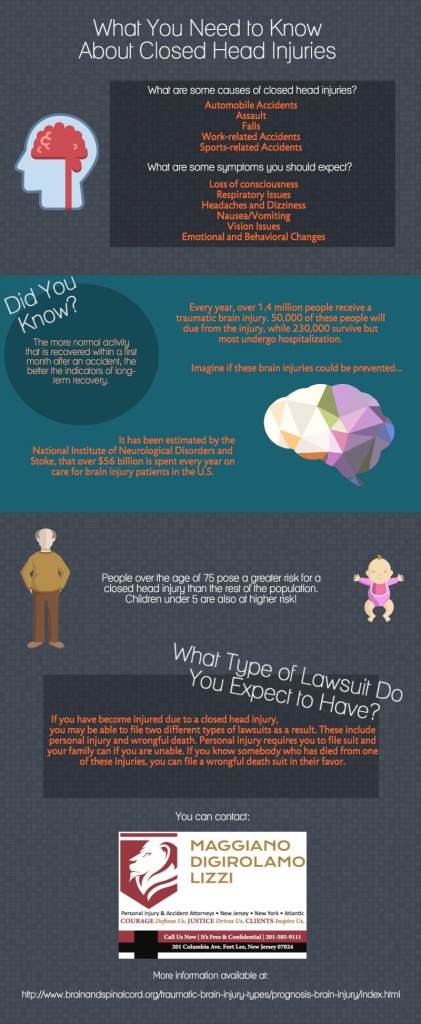What You Need to Know About Closed Head Injuries
Each year, there are 2 million Traumatic Brain Injuries (TBI). These TBIs are a major cause of death and disability in the United States and actually contribute to about 30% of all injury deaths. These injuries could be caused by bumps, blows, or jolts to the head or a penetrating head injury that disrupts the normal functions of the brain. Severity levels can range anywhere from “mild” to “severe” in nature. Most of the accidents taking place cause a mild injury known as a concussion, which you are more than likely familiar with (CDC).
So what is a closed head injury? This is a type of trauma where the brain is injured because of a sudden blow to the head or a motion that causes the brain to knock against the skull. Closed head injuries are different from open head injuries because no object actually penetrates the brain when they occur. The causes of closed head injuries can include automobile accidents, assaults, falls, work-related accidents, and sports accidents.
What are the symptoms of closed head injury?
Severe closed head injury symptoms will typically show up directly due to the severity. However, with mild injuries, symptoms may show up days or even weeks after the injury actually occurs. The symptoms may include loss of consciousness, dilated pupils, respiratory issues, convulsions, headaches, dizziness, nausea, speech and language problems, vision issues, or emotional and behavioral changes. When it comes to recovery time, degree and rate of recovery can vary depending on the circumstance.
The Truth in Disabling Conditions and Negligence
At this day in time, an estimated 5 million Americans have some type of disabling condition due to the fact that they sustained a traumatic brain injury. Because of this, they will need to have continued medical care and personal assistance throughout their lives. Sometimes, another person’s negligence has caused the TBI in some way. Careless driving and failure of employers to provide adequate safety are two very common issues at hand that could lead to somebody sustaining a brain injury. There are people that are more at-risk to these accidents than others. People who are prone to brain injury are ones who are over age 75 and children under 5.
So what compensation should you expect to receive? Financial compensation awarded in a court of law for a closed head injury include hospitalization, medical care for an entire lifespan, home caregivers, rehabilitation, counseling, lost wages, travel expenses for medical care, and even funeral expenses. Those who are seeking compensation should be sure to keep all receipts for expenses related to their injury for later use (Newsome).
Traumatic Brain Injury can pose a huge challenge to whoever is seeking compensation. This is why research needs to be executed in this area to find out what should be expected from a case. ICD-9 Classifications for diagnosis are used in Post Concussion Syndrome and this condition relates to known changes in the brain. These changes are different from anxiety disorders in the way that brain injuries affect cognitive functions like perception, thinking, remembering, synthesis, concentration, and analysis.
If you believe that you have sustained a brain injury at the fault of another person, negligence may be in question and you may have a claim. It just so happens that at Maggiano, DiGirolamo & Lizzi, we have all the experience you need as an attorney able to take on your case. Call today for a free consultation to see where you stand.
| Works Cited: |
|---|
CDC. Centers for Disease Control and Prevention, 2015. Web. Accessed October 25, 2015. http://www.cdc.gov/traumaticbraininjury/get_the_facts.html
Newsome/Melton. BrainAndSpinalCord.org, 2015. http://www.brainandspinalcord.org/traumatic-brain-injury-types/closed-brain-injury/index.html



















